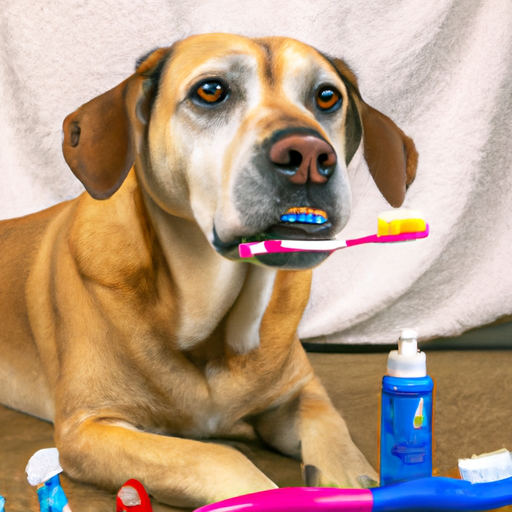Understanding the Importance of Dental Care for Dogs
You may not think that dental care is that important for your furry friend, but think again. Just like humans, dogs can suffer from a host of dental issues, from plaque and tartar buildup to gum disease and tooth decay.
According to the American Veterinary Medical Association, 80% of dogs show signs of oral disease by age 3. These conditions can lead to severe discomfort, difficulty eating, and can even shorten your dog’s life.
Recognizing the Signs of Dental Problems
Your precious pooch can’t tell you when they’re suffering from a toothache. It’s up to you, the caregiver, to recognize the signs of dental problems. Here’s what to look for:
- Bad breath
- Loose or discolored teeth
- Loss of appetite
- Excessive drooling
- Bleeding from the mouth
If you notice any of these symptoms, it’s time to take your dog to the vet.
Regular Brushing: The Cornerstone of Dental Care
Just like with humans, brushing your dog’s teeth is the best way to prevent dental disease. Here’s a step-by-step guide:
- Choose the right tools. Use a toothbrush designed for dogs and a canine toothpaste.
- Make it a positive experience. Reward your dog with praise and treats to make them associate tooth brushing with positive feelings.
- Start slowly. Let your dog get used to the taste of the toothpaste and the sensation of having their teeth brushed.
- Brush gently. Use gentle, circular motions and focus on the outer surfaces of the teeth.
Remember, consistency is key. Aim to brush your dog’s teeth daily, or at least several times a week.
Diet and Dental Treats
Feeding your dog a healthy, balanced diet can help keep their teeth in good shape. Hard kibble can help scrape away soft tartar, while certain treats and toys can help clean teeth and freshen breath.
Consider the following options:
- Dental chews and toys
- Dental diets
- Rawhide chews
- Fresh vegetables like carrots and celery
However, these should not replace regular brushing and veterinary dental cleanings.
Regular Vet Checkups
It’s also crucial to take your dog to the vet for regular dental checkups and cleanings. Your vet can spot early signs of dental disease and take action to prevent it from getting worse.
| Age of Dog | Frequency of Checkups |
|---|---|
| Puppy | Every 3-6 months |
| Adult | At least once a year |
| Senior | Every 6 months |
Frequently Asked Questions
Q: Can I use human toothpaste to brush my dog’s teeth?
A: No, human toothpaste can be harmful to dogs. Always use a toothpaste specially designed for dogs.
Q: How often should I brush my dog’s teeth?
A: Ideally, you should brush your dog’s teeth every day. However, if this is not possible, aim for at least several times a week.
Q: Can diet alone keep my dog’s teeth clean?
A: While a healthy diet can help, it should not replace regular brushing and vet checkups.
Remember, as a caregiver, your dog’s health and happiness depend on you. By taking care of their teeth, you’re not just ensuring a sparkling smile, but also a healthier, happier life for your furry friend.



